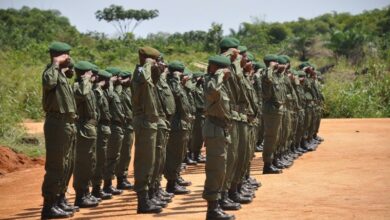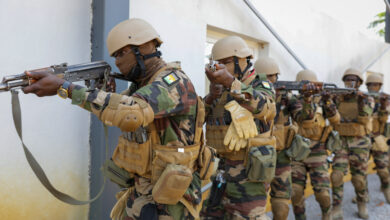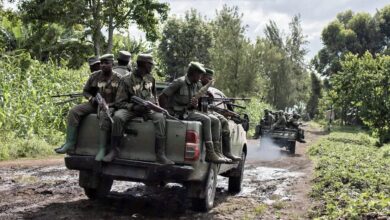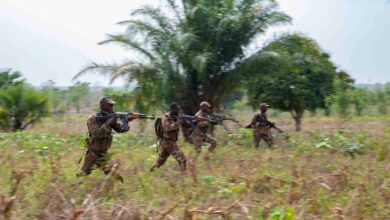At least 50 people were killed overnight in two new attacks in the Democratic Republic of Congo’s deeply troubled east, monitors said Monday.
A local official blamed the notorious ADF militia, which has been linked to the Islamic State group, but others said the attacks may have been ethnic in origin.
Citing a provisional toll, the Kivu Security Tracker (KST) said 28 people had been killed in Boga and 22 in Tchabi, villages lying about 10 kilometers (six miles) apart in an area known for Allied Democratic Forces attacks and community friction.
Au moins 20 civils ont été tués au village de #Boga et au moins 19 au village de #Tchabi (territoire d'#Irumu, #Ituri) dans la nuit d'hier à aujourd'hui. Parmi les victimes de l'attaque de Tchabi se trouve la femme du chef de la chefferie de Banyali-Tchabi. #RDC pic.twitter.com/FeG2q3Ru67
— Baromètre sécuritaire du Kivu (@KivuSecurity) May 31, 2021
The respected monitor said this was the highest death toll it had recorded in a single day since it was founded in 2017. It had earlier given a tally for the attacks of 39 dead. One community leader said children and the elderly were among the victims.
The DRC army gave a slightly higher provisional toll of 53 after a meeting of security forces in Bunia, the capital of Ituri province where the attacks took place. Local MP Gracien Iracan spoke of 60 dead.
“Seven trucks arrived to remove the victims — it’s a dramatic situation,” Iracan told AFP. “They’re still finding bodies, so the toll is likely to grow,” he added, while “many wounded people are still hiding in the bush, everyone fled there”.
A UN source told AFP that South African blue helmets from the MONUSCO peacekeeping mission’s small base in Tchabi had exchanged fire with the attackers when they tried to intervene.
A local civil society leader attributed the attacks to the ADF, a historically Ugandan Islamist group blamed for a string of massacres in the past 18 months.
The two villages lie on the border between North Kivu and Ituri provinces in an area where the ADF is believed to be active.
‘Targeted’ Assault
Lawmaker Iracan said that “a very large number of attackers showed up. The assault was well targeted, they killed two local leaders. We can’t rule out that they were settling scores,” he added.
The KST said the wife of a traditional leader in Benyali-Tchabi had been killed in the attack on Tchabi.
Two local officials reached in Boga by AFP said the assailants had attacked a camp for displaced people. They said 36 bodies had been found so far in Boga, a figure that has yet to be independently confirmed.
Those same officials also cautioned against immediately blaming the ADF, given the ethnic conflicts in the region.
Suspicions that the violence was ethnically motivated stem from the fact that the displaced people’s camp in Boga mostly hosted displaced people from the Nyali group — but a nearby site housing Banyabwisha people was spared.
“We think it was the same group” behind the attacks on both villages, the head of the Nyali community in Tchabi told AFP by phone. “They attacked around 1:00 am. There are children and the very old among the dead… at the moment we’re preparing to bury them,” he added.
Military Government
The ADF is the deadliest of an estimated 122 armed militias that roam the mineral-rich east of the DRC, many of them a legacy of two regional wars that ran from 1996 to 2003.
As of Friday, the KST estimated that at least 1,228 civilians have been killed in the Beni territory of North Kivu alone since November 2019, when DRC forces launched a crackdown that splintered the ADF into smaller groups.
Three other attacks since last Tuesday, blamed on the ADF, have claimed 39 lives.
On March 11, the United States said the ADF was linked to IS, which is also known by the acronym ISIS. The ADF was called ISIS-DRC, or Madina at Tauheed Wau Mujahedeen.
DRC President Felix Tshisekedi on May 6 proclaimed a 30-day “state of siege” in North Kivu and Ituri in a bid to curb bloodshed by the ADF.
Under the move, military and police officers have taken over from civilian authorities.












